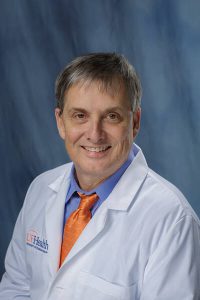
S. Parrish Winesett, MD, is the Medical Director of the Precision Ketogenic Therapy program for pediatrics, a board-certified pediatric neurologist and pediatric epileptologist. He has had extensive experience with complex epilepsy, including pre-surgical evaluations and advanced EEG monitoring. He also has expertise in nonpharmacologic treatments for epilepsy, including vagal nerve stimulation and special diets, such as the ketogenic and modified Atkins diets.
Dr. Winesett graduated from the University of Florida with a degree in microbiology and received his medical degree from the University of South Florida. He trained in pediatrics and internal medicine at the University of South Florida, child neurology at Vanderbilt University, and epilepsy at the University of South Florida.
Medications presently available only adequately treat approximately 60% of epilepsy patients leaving a large number of patients that need another option. Even when they work, medications can have unacceptable side effects like sedation and drooling. Dietary therapies such as PKT can provide an option that can be effective even when medications are not effective. In addition, PKT does not cause the sedation and cognitive side effects seen with many antiseizure medications.
Sometimes it does take a village to take care of the complex patients we see in PKT clinic. The patients we see often have many seizures per day and are quite unique so a “one size fits all” approach is not optimal. Dr. Borum and her students put in many hours of work trying to get optimal recipes for the patients taking into account their individual preferences and needs. I could not perform the necessary work to do individual prescriptions for patients without the help of the Borum Lab.
Telehealth is ideal for starting and maintaining patients on PKT. I do need to see a patient at least once and “lay hands” on the patient, but telehealth gives us the ability to see patients in their homes where they prepare meals on a more frequent and personal basis. Most families find telehealth so much easier to integrate into their life. They don’t have to travel, take a whole day out of their life traveling to Gainesville and navigating the clinics at UF. Many of our patients require specialized transportation, which required arranging many days in advance and hoping they would arrive in time for our appointments. Telehealth makes seeing us so much easier. In the past, we often started the diet in the hospital using a minikitchen to imitate home, but now we let the family use their own kitchen. This allows us to see the challenges in preparing the meals for the family and we often find ways to help get around these challenges.
It takes commitment. It is hard to do any diet and not being totally committed often ends in failure. For a patient who is doing well on medications, the commitment is unlikely to be there even if the patient “hates to take medications”. For the patient whose life has been devastated by epilepsy and medications have not been helpful, it can be a very good option.
PKT is a journey. There are a few disorders where we can predict that the patients will do well on PKT. For most patients, we try it to see if it will be successful. I have patients where PKT has been “miraculous” and stopped all seizures, but the patient stopped the diet on their own and the seizures return. Amazing to me there are some patients (and parents) who would rather have seizures than give up the freedom to eat wherever and whatever they want. I have other patients who have done well and would not think about stopping the diet, because it has given them back their life. I also have patients where it did not work and we stopped the diet. We ask patients to do it for a year since they often have few other choices for treatment of their seizures and we want to give it the best try we can before we stop. There are some patients who don’t have the commitment necessary to do the diet and we will never know if it would have worked since they don’t adhere to the diet for more than a month or so.